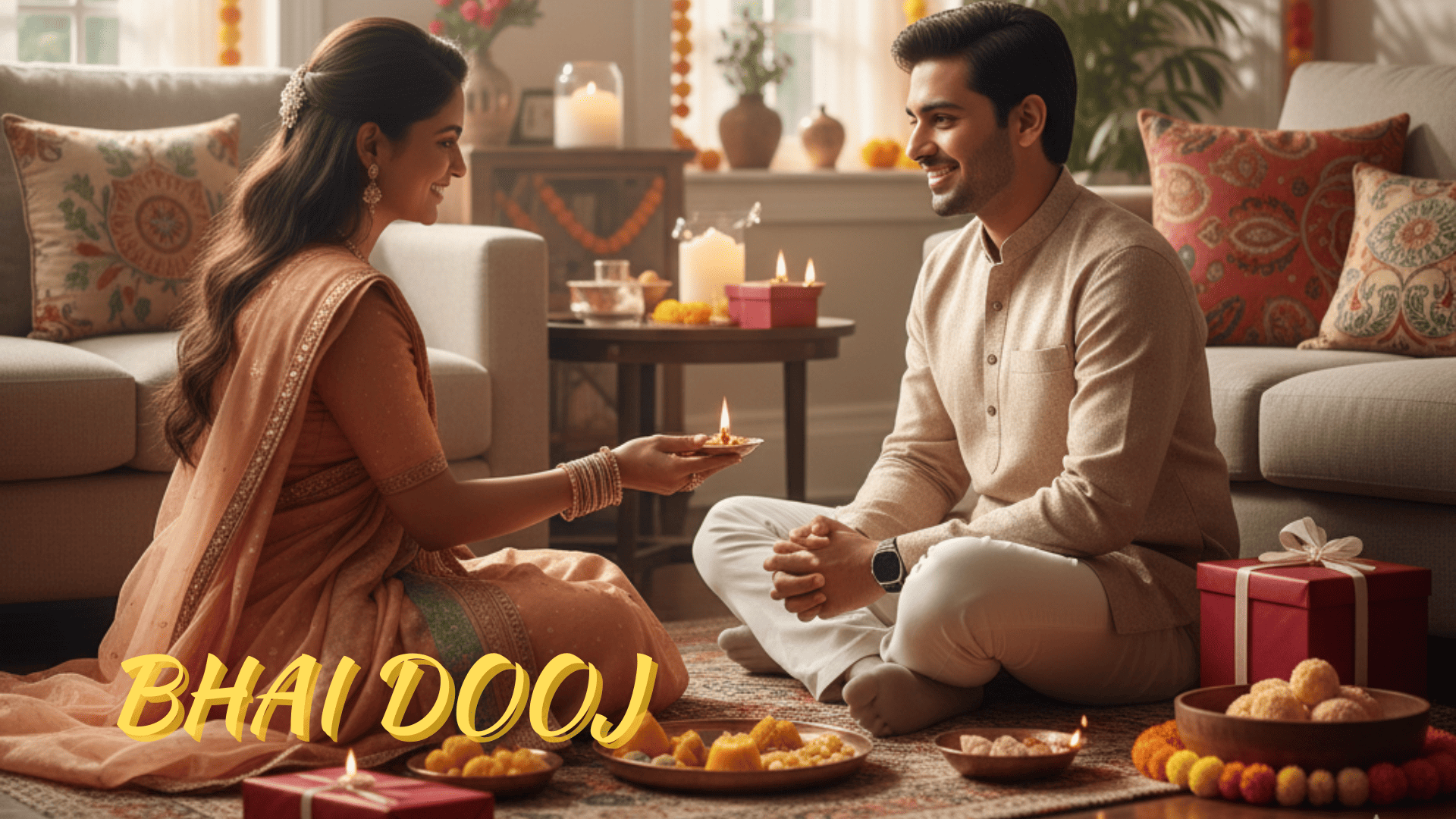How Does Bhai Dooj Celebrate The Sacred Bond Between Brothers And Sisters?

Bhai Dooj is a cherished festival in the Hindu tradition, celebrated with devotion and enthusiasm across India, especially in regions like Uttar Pradesh, Bihar, Madhya Pradesh, and parts of Nepal. This festival honors the sacred bond between brothers and sisters, combining cultural practices with spiritual significance. On this day, sisters pray for the well-being and long life of their brothers, while brothers reaffirm their commitment to protect and support their sisters throughout life.
Observed on the second day after Diwali, Bhai Dooj symbolizes the triumph of light over darkness, reflecting hope, prosperity, and family unity. Devotees engage in meaningful rituals such as applying tilak, exchanging gifts, and sharing festive meals. These customs are not merely ceremonial; they carry profound emotional and spiritual significance, teaching values such as gratitude, respect, and responsibility between siblings.
Rituals and Customs
The festival’s traditions are simple yet powerful in nurturing sibling relationships. Sisters perform aarti for their brothers, apply ceremonial tilak on their foreheads, and offer sweets and delicacies prepared with care. Brothers, in return, present gifts as a gesture of love and protection. These actions go beyond symbolism they create emotional closeness, strengthen trust, and reinforce lifelong bonds. In some households, fasting, meditation, and prayers are incorporated, adding a spiritual dimension to the festivities.
Although Bhai Dooj primarily celebrates sibling ties, it shares themes with other festivals like Karak Chaturthi, which emphasize devotion and commitment, and chhat puja, which encourages spiritual discipline and connection with natural forces. Integrating these practices into family life helps maintain cultural continuity and moral values.
Emotional and Spiritual Significance
The observance of Bhai Dooj enhances empathy, patience, and emotional intelligence among siblings. Through rituals and prayers, siblings learn mutual respect, care, and the importance of nurturing relationships. Focusing on devotion, mindfulness, and prayer encourages participants to engage in introspection, fostering inner growth.
Spiritually, the festival teaches the balance of duties and emotions. By performing rituals with sincerity, devotees cultivate a sense of discipline, humility, and gratitude. The connection to natural elements, such as using earthen lamps and offerings, reinforces respect for the environment and harmony with the universe.
Modern Relevance
In today’s fast-paced world, Bhai Dooj provides an opportunity for families to pause, reflect, and reconnect. Urbanization and global lifestyles may reduce daily interaction among siblings, but festivals like Karwa Chauth preserve the essence of familial love and cultural identity. Celebrating these days allows modern families to uphold traditions, practice mindfulness, and cultivate emotional bonds that may otherwise weaken over time.
The festival’s significance is also evident in global Indian communities, from New York to London to Dubai. Even in these urban settings, it is observed with the same devotion and joy, ensuring that younger generations maintain a connection to their cultural heritage. The practices teach patience, emotional control, and mutual care, which are relevant values in contemporary life.
Community and Cultural Importance
Bhai Dooj strengthens social bonds by bringing families and communities together. People gather in homes, temples, and open spaces to celebrate collectively, singing devotional songs and preparing traditional meals. Such gatherings highlight equality, as participants from all walks of life share in the festivities. Community celebrations not only provide joy but also reinforce a sense of belonging and cultural identity, ensuring that traditions remain vibrant across generations.
Culturally, It’s promotes awareness of ethical living and family responsibility. The rituals and teachings of the festival impart values that go beyond the day’s celebrations, influencing participants in their personal and social lives. By observing Bhai Dooj regularly, families nurture virtues such as integrity, respect, and mindfulness, which strengthen relationships and societal harmony.
Conclusion
Bhai Dooj is more than a festival it is a celebration of enduring sibling bonds, spiritual mindfulness, and cultural heritage. By participating in its rituals, siblings strengthen emotional ties, cultivate virtues like respect and gratitude, and reinforce family unity. Its timeless customs preserve tradition while providing meaningful lessons for modern life, showing that love, devotion, and responsibility remain central to human relationships.
FAQs
Q1. What is the main significance of Bhai Dooj?
Bhai Dooj celebrates the sacred bond between brothers and sisters, emphasizing love, protection, and mutual respect, while also fostering spiritual discipline and family unity.
Q2. What are the traditional rituals observed during Bhai Dooj?
Sisters perform aarti, apply tilak on their brothers’ foreheads, offer sweets, and pray for their well-being, while brothers give gifts and pledge protection, strengthening emotional and spiritual bonds.
Q3. How do modern families celebrate Bhai Dooj?
Even in urban and international settings, families celebrate Bhai Dooj by performing traditional rituals, exchanging gifts, preparing festive meals, and reinforcing sibling bonds while maintaining cultural and spiritual values.
- Art
- Causes
- Crafts
- Dance
- Drinks
- Film
- Fitness
- Food
- Jeux
- Gardening
- Health
- Domicile
- Literature
- Music
- Networking
- Autre
- Party
- Religion
- Shopping
- Sports
- Theater
- Wellness






